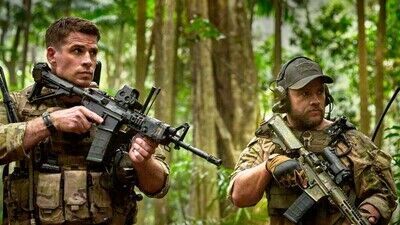Crowe’s most endearing when he’s staring wide-eyed at mood-lit banks of computer monitors, relaying and extrapolating information with his supportive wing-lady, Staff Sergeant Nia Branson (Chika Ikogwe). Grimm’s a lot less charming when he’s mostly explicitly making the movie’s big bathetic point, all about the military’s failure to support capable, dedicated professionals like Grimm, who has to fight up-hill to be taken seriously. “Land of Bad” may sell itself as a post-“Black Hawk Down” rescue mission thriller, but it’s too often a baggy dramatized lecture about what’s really wrong with the American military and modern warfare.
As Kinney’s handler, Grimm guides Hemsworth’s overwhelmed, but capable soldier while he shoots, climbs, and wades through enemy territory in search of a high priority hostage. The prisoner in question is a CIA spy who’s been gathering intelligence on a dangerous Russian arms dealer. None of that matters once Kinney’s team engages with their bloodthirsty enemies, who, according to some introductory on-screen narration, are among “the most violent extremist groups in Southern Asia.”
The makers of “Land of Bad” mostly reduce their movie’s antagonists to generic obstacles for Kinney, except for a few key scenes that strain to establish why they’re actually the worst. These bad guys (briefly) revel in their psychopathy, torturing and executing their prisoners in a “Saw”-looking cave prison. “I look a man in the eye and I make my choice intimate,” one torture-prone terrorist boasts, moments after Kinney insists, “That’s not the conversation we should be having right now.”
So when is the right time? Maybe not in “Land of Bad,” where hero #1 rarely slows down long enough to explain himself while hero #2 should probably follow suit. Grimm’s a neurotic mess, an energy-drink fueled loner who takes great umbrage with snotty (and notably younger) Colonel Virgil Packett, played by Daniel MacPherson. Some pains are taken to humanize Grimm, mostly during for-the-cheap-seats comedic asides about how ignoble, but also down-to-earth he is.
Grimm’s particular about his work chair. He makes a big to do about Keurig-style coffee pods and is painfully sincere when he tells Branson that a wedding is, “probably the greatest social ritual that humanity has.” Grimm’s also the only one who can bring Kinney back safe, a rote characterization that’s mainly unbearable given how plodding and plentiful Grimm’s scenes are. Why is there so much of hero #2 in this movie, or really, why do we have to know so much about him in order for his rapport with hero #1 to matter?

